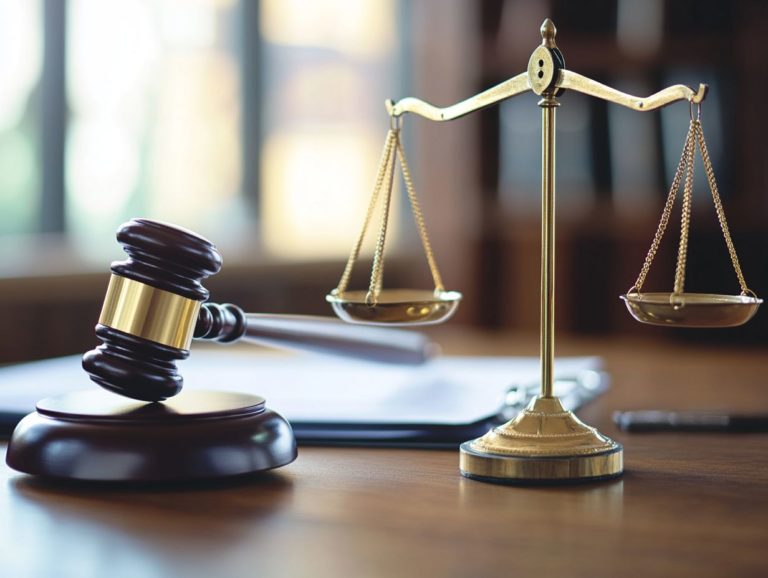How to Find Court Records?
If you want to dive into legal documents, understanding court records is essential! They can help you with everything from criminal cases to family matters.
In North Carolina, these court records are public, enabling you to obtain essential information about divorce judgments, marriage licenses, police reports, and real estate transactions.
The clerk of court is responsible for maintaining these records. They can encompass official court reporter transcripts or typed transcripts from court proceedings.
All of these documents are vital in promoting transparency within the legal system.
Contents
What are Court Records?
Court records are the official documents that lay out the details of legal proceedings, covering everything from criminal cases to civil disputes and divorce judgments.
These records are invaluable for grasping the outcomes of legal actions and the reasoning behind judges’ decisions. They encompass a diverse range of categories, including:
- Criminal records, which detail charges, convictions, and sentencing information.
- Civil records, reflecting disputes related to property, contracts, and personal injuries.
- Family court documents, outlining custody arrangements, divorce settlements, and adoption proceedings.
Such records are essential not just for legal professionals navigating the complexities of cases but also for individuals conducting background checks or looking into historical legal matters.
For example, accessing divorce judgment records can provide insights into the legal precedents that may influence custody cases you might encounter.
Importance and Uses
The importance of court records cannot be overstated, particularly in North Carolina. These public documents serve as a cornerstone for transparency and accountability within the legal system.
Access to these records is essential for people involved, including legal professionals and the general public. You ll find that these records are invaluable tools for conducting thorough legal research.
They give attorneys the power to construct robust cases by analyzing prior decisions and precedents. They also play a crucial role in background checks, enabling employers and individuals to verify the history and qualifications of potential hires or partners.
In property disputes, court records provide clarity on ownership and claims against property, which are known as encumbrances. This documentation is necessary to influence outcomes effectively.
For journalists and researchers, these documents offer rich opportunities to uncover stories and trends that impact communities. Don’t miss out on the opportunity to uncover valuable information!
Ultimately, the accessibility of court records not only enhances knowledge-based decision-making but also contributes to fostering a more just society.
Types of Court Records

Court records encompass a variety of categories, including criminal cases, civil cases, and family court records like divorce judgments and marriage licenses.
Each type plays a unique role in the legal process, offering valuable insights into the workings of law and governance.
Criminal, Civil, and Family Court Records
Criminal, civil, and family court records are important categories that shed light on legal proceedings and outcomes of various cases within the court system. Each category serves a distinct purpose and adheres to unique legal standards.
Criminal court records document instances where individuals face charges for offenses against the state. They detail everything from arrests to indictments and verdicts, ensuring public accountability.
Civil court records encompass disputes between private parties, covering matters such as contracts, torts, and property disagreements, all categorized by relevant legal principles.
Family court records focus on domestic relations, addressing issues like divorces, custody arrangements, and juvenile matters. They reflect the dynamics of familial legalities. These records are carefully kept by court clerks and are generally accessible to the public through court databases or in-person requests, following established protocols that protect sensitive information.
Dive into this landscape confidently, knowing that transparency and accountability are at the heart of the judicial process.
How to Access Court Records
You can access court records using several methods, whether through online databases, PACER services, in-person requests at public terminals, or directly via the clerk of court in North Carolina. Each option offers a unique opportunity to obtain the information you need efficiently and effectively.
Online Databases and In-Person Requests
Online databases and in-person requests through the clerk of court are two primary pathways for accessing court records. Each offers advantages tailored to your needs.
Online resources like PACER (Public Access to Court Electronic Records) provide a seamless way to access federal court records from the comfort of your home. You can search for case information using names, case numbers, or even filing dates.
Once you re on the site, navigating the user-friendly interface is straightforward just create an account and be prepared for minor fees when downloading documents.
Making an in-person request at the clerk of court can prove invaluable, particularly if you require certified copies or need assistance with complicated cases. You may need to gather specific information in advance, such as the case number or involved parties, and be ready to wait in line or work around limited office hours.
Ultimately, each method has its own merits, depending on your particular requirements and circumstances when seeking access to court records.
What Information is Included in Court Records

Court records hold a treasure trove of information at your fingertips.
You ll find important details like case numbers, victim names, and police reports, all complemented by clearly typed transcripts that document the court proceedings.
Key Details and Terminology
Key details and terminology found within court records, such as case numbers and the role of the official court reporter, are essential for you to understand legal documents better.
These elements act as your roadmap, guiding both legal professionals and the public through the often intricate landscape of judicial proceedings.
A case number serves as a unique identifier for each legal matter, making retrieval and reference easy. The official court reporter plays a critical role by providing an accurate verbatim record of the proceedings, which can be crucial during appeals or disputes regarding what was actually said in court.
Grasping these terms not only enhances communication within the legal framework but also gives you the power to engage more knowledgeably with the justice system.
Tips for Searching Court Records
Searching for court records demands a strategic approach, allowing you to enhance your chances of uncovering relevant case information.
It’s essential to be aware of any potential fee exemptions that could apply, ensuring you navigate the process efficiently and cost-effectively.
Effective Search Strategies
Effective search strategies for court records require various tools and techniques to efficiently locate relevant case information.
To excel in this endeavor, begin by mastering the art of keyword selection. Use specific terms that relate directly to the case such as names, dates, and relevant legal language to sharpen your search accuracy.
Understanding the structure of court records is equally essential; knowing how documents are categorized can save you valuable time. For instance, searching by specific court types, like civil or criminal, or by jurisdiction can help refine your results.
It’s wise to double-check your spelling and ensure that all inputs are precise, as minor errors can lead to missed documents.
Use boolean operators like AND, OR, and NOT to narrow your searches. This can help uncover records that might otherwise remain hidden.
Frequently Asked Questions

How do I search for court records online?
To search for court records online, visit the official website of the court or use a public records database. Enter the name of the person or case you are looking for, and the website will provide you with the available records.
What information do I need to find court records?
The basic information needed to find court records includes the full name of the person or company involved in the case, the location of the court, and the case number (if available). Additional details like the date of the case and the type of court may also be helpful.
Are all court records available to the public?
No, not all court records are available to the public. Some records may be sealed or restricted due to the sensitive nature of the case. However, most basic court records are considered public information and can be accessed by anyone.
How can I request physical court records?
If you can’t find the court records you need online, you can request physical records by visiting the courthouse in person or by sending a written request through the mail. You may be required to pay a fee for copies of the records.
What if the court records I need are not available online?
If the court records you need are not available online, contact the court clerk for assistance. They may provide you with the records or guide you to the appropriate resources.
Can I access court records from other states?
Yes, you can access court records from other states; however, the process may vary depending on the state’s laws and regulations. Some states have online databases that allow you to search for court records from other states, while others may require you to submit a written request.
Ready to find the court records you need? Start your search today!






